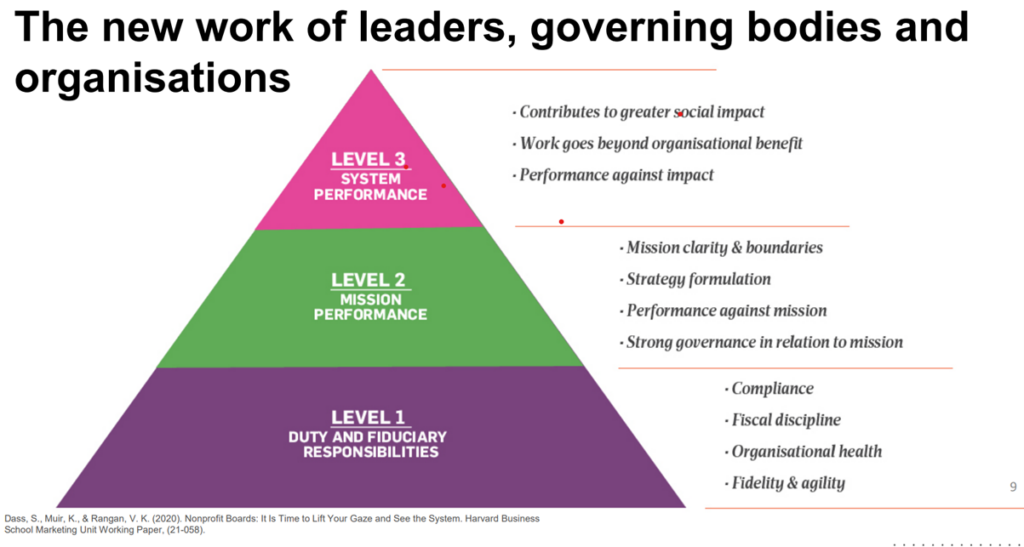
The significant social and environmental challenges faced by Australian communities are complex and interconnected. No one sector, intervention or organisation can solve them alone.
Addressing such complex challenges requires collaboration, systems thinking and a renewed focus on the people and communities in which they live, as was explored in a recent masterclass on Leadership for Social Impact, part of the Australia and New Zealand School of Government’s (ANZSOG) 2023 Public Leadership Masterclass series.
“This was a fantastic masterclass. Both speakers were outstanding; focused, generous with their insights, warm and engaging. The content was spot on for executives needing to understand systems and adaptive leadership. I learnt a great deal that will be valuable not only now but well into the future.” – Leadership for Social Impact participant
“This was a great session, and useful to have some actionable things to take away. It has made me think about the broader concepts of governance and my role as a leader in that.” – Leadership for Social Impact participant
The presenters, Kristy Muir (CEO of the Paul Ramsay Foundation and Professor of Social Policy in the Business School at UNSW Sydney) and Shamal Dass (Head of Philanthropic Services and Family Advisory at JB Were and Adjunct Associate Professor at the Centre for Social Impact ) took participants through the ‘complex and evolving social purpose ecosystem’ framework where the individual sits at the centre and we explore the large variety of agents in the system including governments, philanthropists, corporates, social enterprises and not-for-profit providers.
Professor Muir and Assoc Professor Dass are connected to the Centre for Social Impact, a collaboration of Australian universities who provide education, tools and research to help catalyse social change for a better world.
Both agreed that the social impact sector was facing a range of workforce challenges with shortages of paid staff and a drop in volunteer numbers that had not rebounded post-COVID. This lack of capacity and capability was making it more difficult for the sector to meet the longer-term challenges involved in creating lasting impact in a more complex operating environment.
They outlined a three-level pyramid model for how organisations operated and asked participants how they could lift their gaze from the basic level of compliance, fiscal discipline and organisational health to do the work needed to contribute to greater social impact.
 Source: Dass, S., Muir, K. & Rangan, K. (2020) Nonprofit Boards: It is Time to Lift Your Gaze and See the System, Harvard Business School Working Paper 21-058
Source: Dass, S., Muir, K. & Rangan, K. (2020) Nonprofit Boards: It is Time to Lift Your Gaze and See the System, Harvard Business School Working Paper 21-058
New models of leadership in a time of lower trust
Assoc Professor Dass said that, until recently, Australia had had a ‘dream run’ of economic growth, the benefits of which are accruing to a shrinking proportion of the population, meaning broader social progress had not kept pace.
“This is why we started thinking about a new mode of leadership, of solving problems. We haven’t fulfilled the potential of this country for large parts of the population. So, what have our leaders been doing to make sure all of us benefit? What type of leadership do we need to bring to bear to work across these departments and divisions to actually drive the type of change that is required?” he said.
“Navigating how to create impact has become more complex. Not only are the people who are interested in social impact changing, but the partnerships have evolved as well. The largest portion of the social impact sector is actually government, the not-for-profit sector is an execution partner and an impact partner for government.”
He said that all leaders in social impact needed to focus on their ‘primary duty’ to the public to be effective.
“Your duty to the organisation, the department and minister is one thing, but your primary duty is to the public. If we do not hold the beneficiary at the centre – who will? Governance is not about structures and boards – it’s about that duty to the public.”
Professor Muir said that levels of trust in institutions in Australia had dropped significantly in recent years.
“The general population that we work with or alongside have low levels of trust – and people who are less educated and have lower incomes have even lower levels of trust.”
In a 2022/23 global survey Australians’ trust in NGOs dropped by five percentage points, trust in government by seven and media by five – taking overall trust to lower levels than countries including Italy, Canada, Singapore, Malaysia, China and Mexico.
The value of systems thinking
Professor Muir addressed issues around systems thinking and how organisations could play a greater positive role in the systems that they were part of.
“You have a whole lot of day-to-day work to do to support people, but unless we start to also think about what else are we doing to shift the system around ending homelessness, for example, we are never going to get to those next steps,” she said.
“The system is not broken. Systems always work for someone, that’s why they are the way they are. That doesn’t mean it doesn’t need changing – the challenge comes when we disrupt the system for the people it is currently working for.
‘We need systems thinking when we look at some of these really big challenges where we need different relationships to come together. We need to make sure that, whatever our solutions are, we ask ‘what else is going on?’ in the system.”
She said that agencies needed to think about the complexity of the system they operate in and avoid the trap of putting themselves at the centre of the system, which will present a barrier to taking moving towards the third level of the pyramid: Systems Performance.
“If we really want to get to lifting system performance, we need to include different agents and levers, which means it just can’t be just us doing it, we need to work across sectors, siloes and impact areas to make sure we can get there.”
Assoc Professor Dass said that part of lifting performance was better measurement and being accountable to users of services.
“When we talk to experienced board directors, they say that ‘we don’t measure anything that needs measuring’. We acquit, and then we get more money because we acquitted that contract but do we know whether the millions of dollars that we are spending is actually achieving what we are all trying to?” he said.
“Measure what matters most for those who matter most. If you’re there for the kids, then ask ‘what is the thing you need to measure to know that those kids’ lives are improving. push themselves on how you hold yourselves to account and who you are accountable to.”
He said that the job of leaders was to ‘find the pause’, listen and ask questions about what was going on.
“Asking questions is really important, as is active listening and deep listening for leaders. It is easy to respond to the bit you’ve been given, but you need to ask questions to get a grasp of what’s really going on.”
The masterclass was inspired by the Governance for Social Impact course that Professor Muir and Assoc Professor Dass developed at the Centre for Social Impact for board members in the for-purpose sector.
Arminé Nalbandian, the CEO of the Centre for Impact notes that the “most pressing issue of social inequality cannot be addressed solely by government alone, but by governments working in collaboration with the social purpose and private sectors,”
“The most important area of focus for what we are all collectively trying to achieve in social policy should be on the people impacted, not in serving the confines of the structures we are working in.” Ms Nalbandian said.
“Investment in staff is part of this work. There are 1.4 million Australians working in the charity sector, doing some of the most meaningful work in service of others, largely without the benefit of continuous training and structured peer learning.
“We need new ways of working, exposure to new ways of thinking and opportunities to learn from each other.”
The Leadership for Social Impact masterclass with Kristy Muir and Shamal Dass will be repeated on 10 August and registrations are now open for this and other 2023 Public Leadership Masterclasses (PLM). PLM will re-energise and educate hard-working and passionate emerging and current leaders and expose them to fresh ideas. The thirteen masterclasses cover a range of themes and provide an invaluable opportunity for self-reflection and professional growth for you and your team. PLM is a ‘choose-your-own adventure’ style series which puts you in control of your online learning experience. Choose from various packages which feature masterclasses led by leading domestic and international thinkers on leadership and public management from the public, non-profit and private sectors. Assoc Professor Dass and Professor Muir are also teaching a two-day Governance for Social Impact course in Sydney on 2-3 August.
